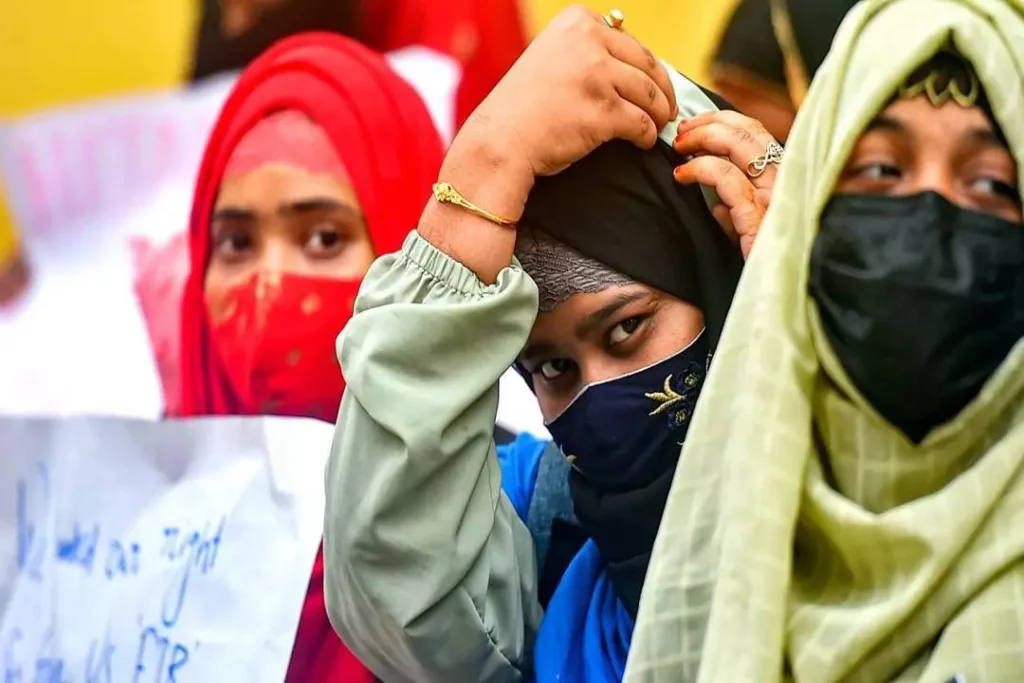Muslim women are weak and oppressed; their voice is never heard of – is the stereotype of our cinema. Their on-screen stories are scripted by Islamophobic industry. However, of late Muslim women began establishing their off-screen realities.
Be it Muskan Khan exhibiting courage, faith, modesty and truth tearing down stereotypes in a couple of minutes with her stare and stance and changing the global narrative of course helped by a generation who fathoms best in using social media these days. The girl became a token of Karnataka’s Hijab resistance.
Just before coronavirus pandemic kicked off, the ‘SHEROES’ of Jamia Millia Islamia – Farzana’s and Renna’s similar such social media videos exhibiting heroism, shielding their male university friend, went viral, becoming the symbol of CAA resistance then.
At a time when young girls were debunking T.V. serials, movies and mainstream stereotypes while avowing their rights, the elders too didn’t hold themselves back, inscribing their names in the bravery list of the country’s women’s ‘Hall of fame’ – the acclaimed Bilikis Dadi of Shaheen Bagh in her 90s made it to the Time Magazine’s ‘The Hundred Most Influential Women of the Year’. Collectively women were at the frontiers of resistance across all Shaheen Baghs.
It was just recently when media’s stereotype of #HijabNahiKeetabDo was unmasked by Bushra Mateen, who bagged 16 Gold Medals, shattering new records in Karnataka. She was a Hijabi, exemplary of the message ‘My Hijab covers my head and not my brain’. Anti-Triple Talaq law and CAA resistance led by women was one of the most powerful women resistance post-Independence in the country’s history yet looked away by the mainstream.
Ironically, commissions of Women Empowerment and other feminist ideological organisations were not visible in such issues. Looks like women’s days, campaigns of empowering women and expressions of ‘My Life My Choice’ are only reserved for western clothing or when it suits them.
At a time when girls were buried alive and considered a transferred property in 610 CE, Islam surfaced as a saviour for women, rendering them their rights, dignity, modesty, property or inheritance laws, right to accept or reject proposals, right to divorce, right to own businesses, right to learn, etc. Islam preserved women through a system such as instructing men first to lower gazes and then instructing women to cover to come to possessions of recognition, dignity and remaining unharmed from all ills of society and imposed severe laws on the criminals like portending death penalty to rapists. Islamic schooling of modesty for both men and women, guarding one’s private part, accountability, respect for women, capital punishment, fear of God, belief in the hereafter can curb the menace of rape horrors like those in Hathras, Priyanka Reddy murder case, etc.
Supplementary providence was designated to them, manufacturing moral ethos like the world’s famous idioms of the Prophet ﷺ – ‘Heaven lies under the mother’s feet’, mother receiving precedence over father, also best humans are those who are best to wives. Female infanticide and foeticide were absolutely extirpated. To be clear on Islamic notion: It’s not wanting feminism nor men’s superiority, it’s founded on JUSTICE to each sex depending upon their role on different social and family levels, comprising neither more nor less rights or responsibilities, cognisant their physical, emotional, mental and intellectual functions like exculpating women from obligation to earn or spend any money for household expenses, primarily it’s shouldered upon men due to their stronger physiological, psychological and mental make-up.
Women inherit fortunes from father, mother, husband and brothers. Dowry is strictly prohibited rather surprisingly it was made obligatory for groom to gift ‘Maher’ (a marriage gift) to the bride, that too whatever she desires, not what he wants to!
Apart from acknowledging it as an unerring Way of Life, women perceive it as a provenance of comfort, as a regimen which could fortify their integrity, prerogative and rights and protect them from all prevailing evils in society.


